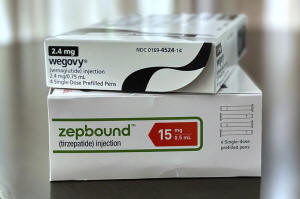Weight-loss drugs may lower cancer risk in people with diabetes, a study
suggests
[May 23, 2025]
By CARLA K. JOHNSON
Excess body weight can raise the risk of certain cancers, leading
researchers to wonder whether blockbuster drugs like Wegovy, Ozempic and
Zepbound could play a role in cancer prevention.
Now, a study of 170,000 patient records suggests there's a slightly
lower risk of obesity-related cancers in U.S. adults with diabetes who
took these popular medications compared to those who took another class
of diabetes drug not associated with weight loss.
This type of study can't prove cause and effect, but the findings hint
at a connection worth exploring. More than a dozen cancers are
associated with obesity.
“This is a call to scientists and clinical investigators to do more work
in this area to really prove or disprove this,” said Dr. Ernest Hawk of
MD Anderson Cancer Center in Houston, who was not involved in the study.
The findings were released Thursday by the American Society of Clinical
Oncology and will be discussed at its annual meeting in Chicago. The
study, funded by the National Institutes of Health, was led by Lucas
Mavromatis, a medical student at New York University’s Grossman School
of Medicine.
“Chronic disease and chronic disease prevention are some of my
passions,” said Mavromatis, a former research fellow with an NIH
training program.

[to top of second column]
|

Boxes for the medications Wegovy and Zepbound are arranged for
a photograph in California on May 8, 2025. (AP Photo/JoNel Aleccia,
file)
 GLP-1 receptor agonists are
injections used to treat diabetes, and some are also approved to
treat obesity. They work by mimicking hormones in the gut and the
brain to regulate appetite and feelings of fullness. They don't work
for everyone and can produce side effects that include nausea and
stomach pain.
In the study, researchers analyzed data from 43 U.S. health systems
to compare two groups: people with obesity and diabetes who took
GLP-1 drugs and other people with the same conditions who took
diabetes drugs like sitagliptin. The two groups were equal in size
and matched for other characteristics.
After four years, those who took GLP-1 drugs had a 7% lower risk of
developing an obesity-related cancer and an 8% lower risk of death
from any cause compared to those who took the other type of diabetes
drug. There were 2,501 new cases of obesity-related cancer in the
GLP-1 group compared to 2,671 cases in the other group.
The effect was evident in women, but not statistically significant
in men. The study couldn't explain that difference, but Mavromatis
noted that differences in blood drug concentration, weight loss,
metabolism or hormones could be at play.
All contents © copyright 2025 Associated Press. All rights reserved |